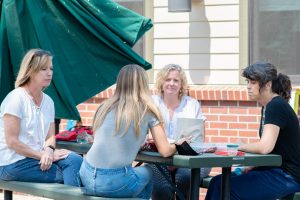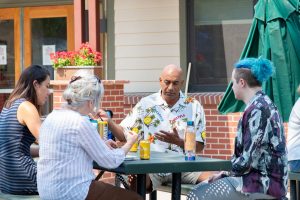Written in collaboration with Joe Pausback and Roger Chow


Most of us are familiar with student codes of conduct which, depending on the school, can range from essential agreements on how students treat one another to prescriptive rules for behavior and dress. At Mackintosh Academy, some rules are written into our handbook, but many of these key agreements are worked out at the beginning of the year in collaboration between students and teachers.
This year, a faculty team took a look at the code of conduct for Mack faculty and decided that a similar process would benefit our team of educators. We asked two of the committee members who took on this task to share the story of how they worked towards a new faculty code of conduct.
We are principled
We do what is asked of us to the best of our ability with regard to the community
We are people of integrity and our words and actions are congruent with the mission of Mackintosh Academy
We take responsibility and work toward resolution
We respect confidentiality and boundaries
We are open-minded
We include all stakeholders and viewpoints in conversation and assume positive intent
We listen for strengths and assets
We receive feedback gracefully
We question our assumptions. We think again 🙂
We are inquirers
We seek information with a sense of curiosity rather than with the goal of being right.
We allow our answers to lead us to deeper questions
We will join students and colleagues on their quests for understanding
We show curiosity outside our comfort zone
On a warm day this past August, as the staff was returning to campus and starting to plan out the new year, we had our annual faculty retreat. As part of this first day together, each staff member joined a committee to take on different responsibilities for the school. A number of us choose to work on the Faculty Advisory Committee. After joining a committee, one of our first activities as staff was to reflect on how we collectively demonstrate the International Baccalaureate (IB) Learner Profile – a distinctive set of attributes valued by IB schools.
This process involved working in small groups, and each group brainstormed how we demonstrate one to two attributes of the Learner Profile. At the conclusion of this activity, the administration challenged the Faculty Advisory Committee to take these brainstormed ideas, and use them to redevelop our Staff Code of Conduct. The newly minted Faculty Advisory Committee responded with a collective “you bet!”
We are knowledgeable
We know, explore, and share our content
Our goal is connection: within, between, and among
We celebrate our individual and collective knowledge base
We engage in ongoing professional development and continue to hone our craft
We are thinkers
We intentionally embrace creative and thoughtful problem solving
We reflectively listen and process before acting
We are risk takers
We view mistakes as part of the process of learning and an opportunity for growth
We strive to receive feedback in a constructive manner
We rethink our teaching craft so that we innovate to best meet the needs of students
We are open to having hard conversations even if we may hear something that may scare us or make us uncomfortable
The committee began by reviewing the old Code of Conduct. It was full of top-down language that seemed not to assume that the teaching staff was clear on the basics of professionalism. There were directives to dress professionally, arrive before 8:00 am, and respond to emails in a timely fashion. It felt as outdated as a ten-year-old computer. As we began to re-envision the Code of Conduct, we agreed to write it in language that came from us and that asserted our professionalism by addressing each of the Learner Profiles using the first person.
We are balanced
We ask for help when have a need and offer help when we see a need
We think in terms of “our students” versus “my students”
We are present and efficient in ways that value the time of others
We are communicators
We model positive talk about ourselves and others
We listen and speak from a place of curiosity and empathy
We value and explore different ways of communicating
We met several times in August and September. We would connect at the end of the day, after carline, work diligently for 30 minutes, and make plans for our next work session. Each of these sessions was tinged with a sense of commitment to the completion of the task but also to the exploration of who we were collectively as as staff. Many times we ran across a way that we might embody the one attribute of the Learner Profile that fit better in another attribute or even was duplicated in another one. We explored the poetry of the language, seeking out just the right active verb and getting rid of unnecessary adjectives.
We are caring
We demonstrate care and respect for all members of our school community
We use caring words and actions
We actively seek opportunities to improve ourselves and serve our community
We promote diverse perspectives
We create a safe environment to be vulnerable and share needs
We are reflective
We hold space for reflection and model the IB Action Cycle for students
We think about the “how” and “why” in order to build meaning
We use both data and reflection to improve our teaching
We are resilient
We lean into challenges with our students and encourage them to engage in productive struggle
We explicitly teach and model growth mindset
We celebrate effort and focus on learning as a process
We take care of ourselves in order to care for others
The process felt very empowering and validating. It was fun to work together and to reimagine this piece of our staff protocols. The result was a fresh new take on who we are as a staff that better represents the voices and identities of the teachers. Looking it over, the Staff Code of Conduct written in the language of the teachers is ultimately transportable, and could be written to describe the code of conduct for a classroom full of elementary school students or the Parent Council. One new teacher came to the staff after reading it and related how she had shared it with her husband and remarked in tears, “I get to work with these people! This is what this school is about!”
Joe Pausback, veteran Mack teacher of more than two decades who is a member of the Faculty Advisory team, commented, “Most other documents I have experienced like this were generated by a group of administrators in a smoky room with a shut door, who assumed that teachers were only slightly more sophisticated than the students. The codes of conduct they generated were top down and wound up in binders that never were opened. In contrast, I hope that this code is empowering and provides a clear set of guidelines for how teachers conduct themselves. And in doing this, I hope it helps to promote a consistent view across the school of what our values are.”
Roger Chow, a 5th and 6th grade teacher new to Mackintosh this year, was another member of the team who worked on this code of conduct. He shared that “The thoughtful and earnest team were incredibly dedicated to getting this right. We wanted to model what we ask of our students and during the process, it felt wonderful to see that adults who work at Mack live by those statements. I believe this code will reinforce the commitment by teachers and staff to embrace and live the philosophy and actions we hold students accountable to.”
We believe that this code of conduct will bring clarity, direction, and empowerment to our entire team of educators. As Diane Dunne, Head of School, remarked, “This was a beautiful process. It reinforced the power of a collaborative effort in order to draw from our collective wisdom and promote our collective commitment to doing our very best as educators.”
